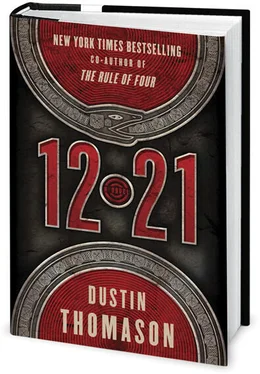Chel had been surprised by her mother’s willingness to talk about Chiam. But now she knew: No matter what effect these last days had on her, Ha’ana was still the same woman who’d abandoned her family’s home, who’d abandoned everything her husband believed in. The same woman who’d spent thirty-three years trying to forget what happened, denying the importance of their culture and tradition.
“Maybe you don’t believe in the lost city because of what it would mean for you, Mom.”
“What are you saying?”
It wasn’t worth it. “Forget it. I have to go. I have work to do.”
What time was it?
Chel glanced at her phone. There she found an email from Stanton waiting:
know you’ll send more news when you have it, but wanted to make sure you’re okay.—G.
She reread the message. For some reason Chel liked knowing he was keeping tabs on her.
Ha’ana was saying something. “You’re really going to search for these ruins now? In the middle of this?”
Chel stood. “Mom, we’re going to search for them because of all this.”
“Search how?”
“With satellites that scan the area for ruins,” Chel said, formulating a plan. “Or on the ground if we can’t find them from the air.”
“Please tell me you won’t go into the jungle yourself, Chel.”
“If the doctors need me to, I will.”
“It’s not safe. You know it’s not safe.”
“Father wasn’t afraid to do what he had to.”
“Your father was a tapir,” Ha’ana said. “And the tapir fights, but he doesn’t run into the jaguar’s den to be slaughtered.”
“And you were a fox,” Chel said. “The gray fox that is unafraid of humans, even those who hunt it. But you lost your wayob ’s spirit when you abandoned Kiaqix.”
Ha’ana turned away. It was a great insult to suggest a Maya wasn’t worthy of her wayob , and Chel instantly regretted her words. Despite her mother’s long, fractured relationship with her origins, her wayob was still a part of her.
“You help many people here,” Ha’ana said after a long pause. “Yet I hear that every time you come, you come only at the end of services. Deep down you don’t believe in the gods either. So maybe we are more similar than you think.”
12.19.19.17.15
DECEMBER 16, 2012
MICHAELA THANE WAS THIRTEEN WHEN THE RODNEY KING verdict set off looting and burning of thousands of buildings from Korea-town to East L.A. Her mother was still alive then, and she had kept Michaela and her brother in the house for nearly four days, where they watched on their nineteen-inch television as rioters set the city ablaze. It was the last time Thane remembered Los Angeles looking as it did now.
On the car radio, she listened to pundits argue about whether it was the email leak from the mayor’s office that had started the unrest. One commentator claimed it was the nearly ten thousand estimated sick—agitated and desperate—leading the destruction. Detractors of Stanton’s quarantine declared this the inevitable result of trying to contain ten million people. But Thane had spent long enough living and working in this part of L.A. to know people here didn’t need a reason to be angry—they needed a reason not to be.
Just before the turn in to Presbyterian, she looked in her rearview mirror to see Davies peel off; he’d trailed her here to ensure her safety. And safe it seemed to be. Floodlights illuminated the night sky, helicopters circled and jeeps swept the perimeter; National Guardsmen with guns patrolled the buildings as if it were a base in Kabul.
Since returning from Afghanistan, Thane had spent nearly every weekday, every third night, and many weekends at Presby. She’d been here on virtually every holiday too, taking the least desirable call nights. Her colleagues thought she did it because she was selfless, but really Thane had nowhere else to go. A hospital operates 365 days a year, twenty-four hours a day, just like a military base. And eating the staff turkey on Thanksgiving and drinking plastic cups of sparkling cider when the clock struck midnight on New Year’s was better than being alone.
Working at Presbyterian had never been easy, and sometimes they had to improvise more than medics in the mountains. The hospital was understaffed and overwhelmed. Yet Thane and her colleagues had provided decent care to tens of thousands of patients nonetheless. They helped other services, did favors for critical patients, listened to one another complain, and drank heavily together to try to forget it all. Over the last three years, the Presby staff had been Thane’s big, messy, occasionally happy substitute for a platoon.
Now so many of them were dying inside these walls, and Presbyterian itself would soon be a memory too. Even if they could stop or slow the disease, they’d never be able to ensure that all the prion was gone from the floors, the walls, the sinks, the bedrails, and the light switches. The building would be demolished and removed by hazmat, piece by piece.
* * *
IT WAS AFTER ONE A. M., but CDC staff still roamed the halls—tending to patients, trying to calm the victims, barking orders at one another. Thane had difficulty seeing their faces through the helmet of the biohazard suit she’d put on, but that also meant it was difficult for them to see hers. As long as no one recognized her, she could walk the wards unnoticed. The suit was sweltering hot and uncomfortable to move in, but she pressed on past rows of listless patients staring at the walls or restlessly pacing their rooms.
Her first stop was on the fourth floor. Meredith Fentress was a heavy-set woman who just a week ago had manned the lobby. Thane had spent many nights chatting with her about the Dodgers and their never-ending string of disappointments.
Now Fentress was whimpering and tossing, covered in sweat.
“You’ll feel better soon,” Thane whispered as she pushed the antibodies from a syringe into the IV, and the yellow-tinged solution dripped into the patient’s vein. Thane watched—just as she and Stanton had discussed—to make sure there was no negative reaction that called for an immediate response.
Nothing. When Thane was sure, she made her way from room to room. Occasionally she had to wait for a CDC doctor to finish with the patient and leave, but for the most part, she thought, it was almost like she was invisible.
Amy Singer was a tiny bottle-blond third-year medical student with whom Thane had done a night rotation in the ICU. As she administered the antibodies, Thane remembered a night that they’d both fallen into an uncontrollable fit of laughter after an old man on the floor confused the two of them.
Suddenly a nurse wearing a biohazard suit walked in. She looked at Thane skeptically. “Can I help you?”
Thane pulled out the CDC ID Stanton had had made for her. “Just taking some secondary samples,” she said. “Monitoring how quickly protein loads are growing.”
The nurse seemed satisfied and continued on her rounds. Thane breathed a huge sigh of relief. So far all had gone well. She prayed that the antibodies were doing their work.
Ten patients later, Thane found Bryan Appleton lying quietly in his bed. His eyes were closed, but of course she knew he lingered in a dangerous netherworld. She also took note of the three deep red scratches on the side of his face—when she was done, she’d attach restraints for his own safety. Appleton was one of the kitchen staff, who had practically force-fed Thane meals on her call nights. He’d always seemed to understand that residents survived on the free eats—oatmeal cookies, melon, juice, and coffee—that magically appeared in the call rooms.
Читать дальше












